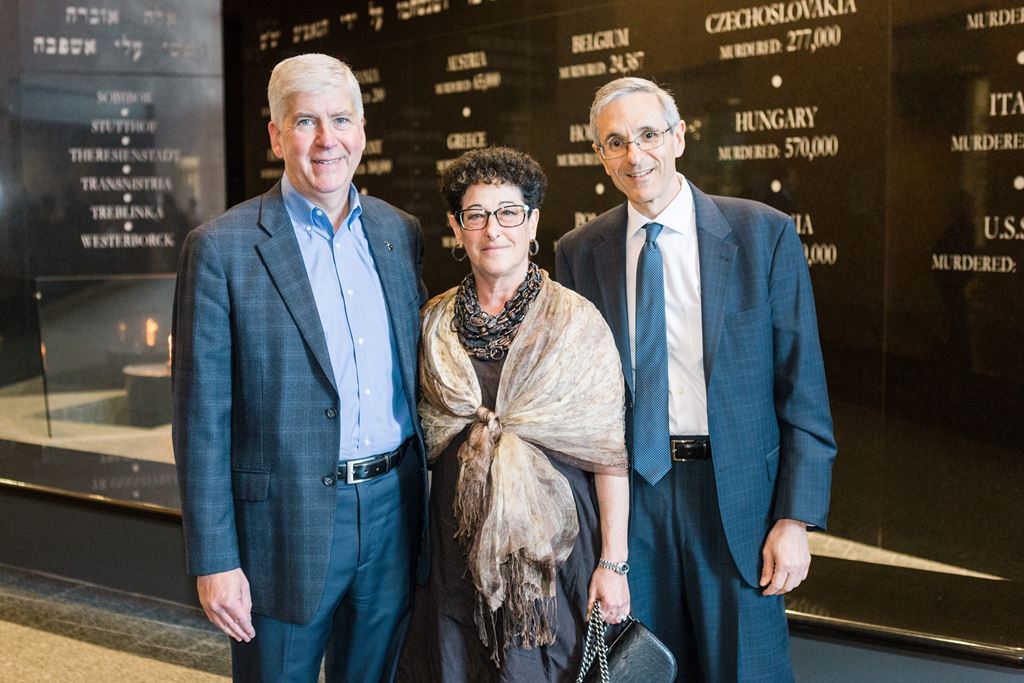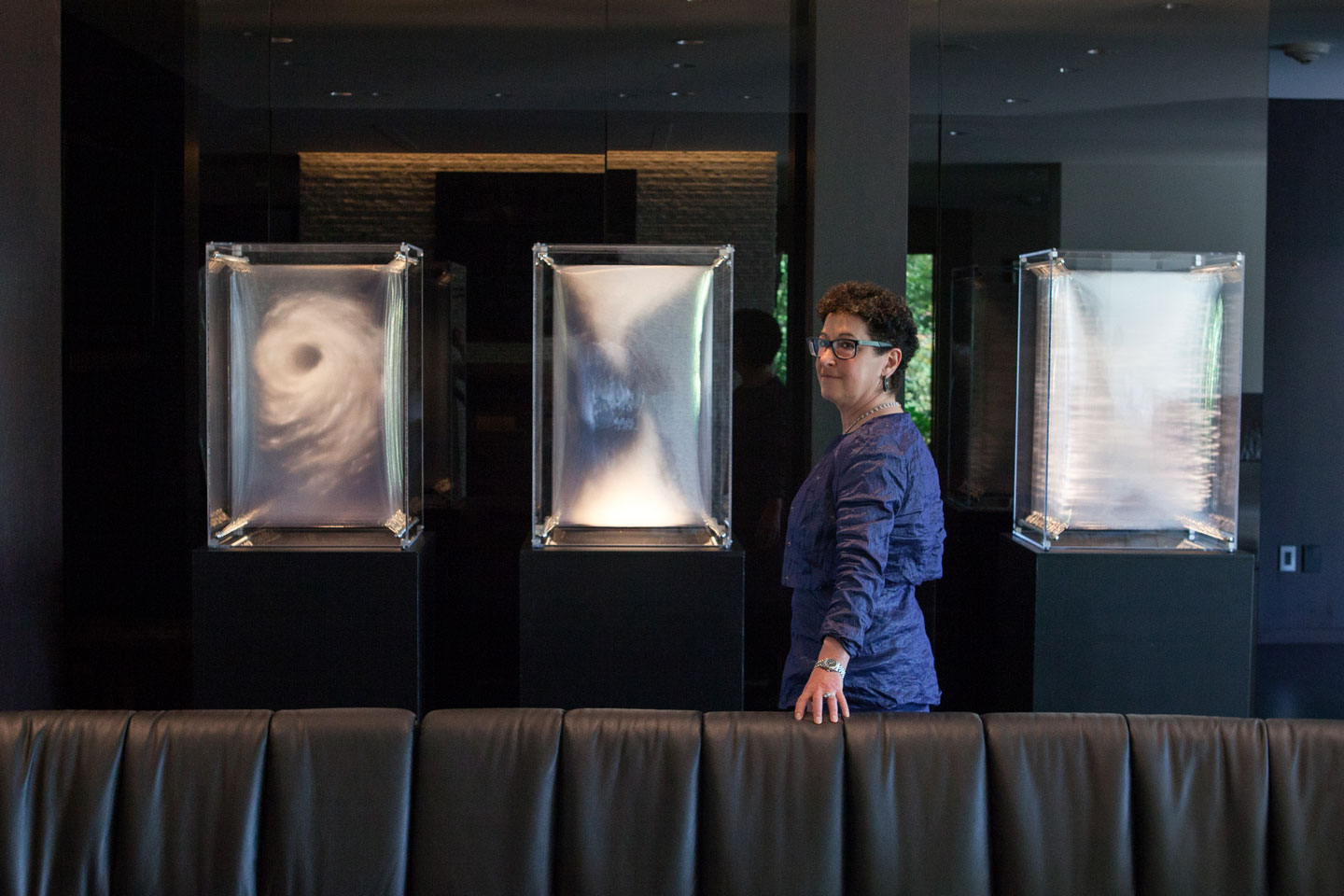Critical Lessons of the Holocaust
By Vivian Henoch, Editor myJewishDetroit
November 1, 2016
Ask Michigan attorney Lori E. Talsky Zekelman what one person can do to make a difference in this world and you won’t get a more impassioned answer than the one she is likely to give:
“Just imagine how different the world would be . . .” she says, “if every human being took the time every day to do one good thing for someone else. Just one minute of kindness.”
Far more than an advocate for simple acts of kindness, Lori is an activist — an agent of change working to raise the bar on education and public consciousness in the difficult arena of human rights issues and humanitarian law. She and her husband, Canadian industrialist and philanthropist Alan S. Zekelman, have a remarkable history of community building and leadership, most visibly through their generous support of the Holocaust Memorial Center Zekelman Family Campus, in Farmington Hills, and the Lori E. Talsky Center for Human Rights of Women and Children at MSU College of Law.
Beyond her practice of family law at Maddin Hauser Wartell, Roth & Heller, Lori’s energies have been focused on the passage of legislation mandating statewide education on genocide and the Holocaust. Through her work with the Talsky Center and a coalition assembled within the Jewish community, Lori’s initiative became a reality on June 14, 2016, when Michigan Governor Rick Snyder signed into law House Bill 4493 requiring that all social studies curriculum for grades 8-12 in Michigan public schools include instruction on the Holocaust and genocide, including the Armenian Genocide.

With the passage of the bill — now Public Act 170 of 2016 — Michigan joins only a handful of states that have enacted such legislation. While other states are moving in that direction, the current list includes New York, New Jersey, Illinois, Florida, Texas, California and Rhode Island — all states where there are Holocaust Museums or centers of education.
How is the study of the Holocaust different than the study of history? Why is genocide education a must today? What invaluable lessons do we take away? In a recent interview with video producer Fran Victor and myJewishDetroit, Lori Talsky Zekelman shares her views:
Q & A with Lori Talsky Zekelman
How is the Holocaust more than history?
Studying the Holocaust is more than looking at facts — when and where — its lessons allow us to consider, explore and reflect upon the worst and the best examples of human conduct and human nature — so we can be and do better.
What are the lessons we need to take away?
The lessons of the Holocaust can be used to probe the questions of what it means to be human; to understand the degree of depravity and inhumanity that we are capable of when there is a state-sponsored ideology of hate unleashed on a society — and when words are used to incite hate and violence; and to appreciate the necessity of helping those who are vulnerable to hate and to celebrate the human capacity to overcome suffering.
Hopefully, learning these lessons inspires us to take actions against injustice: racism, intolerance, anti-Semitism and to fight indifference to the suffering of others.
How you think these lessons are relevant to today?
Despite our goal of “never again,” the reality is, again and again.
Although we have enacted laws to “prevent” racism, injustice and genocide, these laws alone cannot adequately effectuate change. I think we need to focus our attention on creating a society where human beings are more empathetic, tolerant, caring and compassionate.
How do we do that?
We can start by reaching the maximum number of children through public education. That’s why I’ve made the effort to mandate this type of education in the public school system.
What kind of curriculum on the Holocaust and genocide was previously taught in Michigan high schools?
Holocaust education was not being taught across the board and there was no specific curriculum or standard for how the subject was being approached. Basically, every school district made that decision for itself.
In addition to my feelings about the ongoing genocide and inhumane conduct being perpetuated daily around the world, what galvanized me into action in 2013 was the “Mandate Video” by author and educator Rhonda Fink-Whitman. The video demonstrated to me how poorly we are educating the next generation about the Holocaust and its lessons. So I decided the time was right to embark on a journey to try and change that, starting with the goal of getting a law enacted in Michigan that would maximize the number of children who we could reach and inspire through the lessons of the Holocaust and other genocides.
Tell us a little more about that process.
I started the process at Maddin Hauser, by approaching my colleague, John Jacobs, and his wife Gilda Jacobs (former Michigan State Senator and current President & CEO of the Michigan League for Public Policy) and asking for their help in designing a strategy to get such a law passed as quickly and effectively as possible.
We tried to be very strategic in our approach, enlisting an appropriate lobbyist, Sandi Jones of MHSA in Lansing, MI, an extraordinary project manager, Judith Kovach PhD, and selecting the right legislators to sponsor the bill. We took a bipartisan position, working with both Republican and Democratic legislators and dozens of people who we knew to be influential with educators and organizations throughout the state. With the team support of the Holocaust Memorial Center, we engaged MSU Law students involved with the Talsky Center to draft a proposed bill under the oversight of its Director, Professor Susan Bitensky, and to testify about the importance of enacting the bill when it was up for hearing.
And, of course, we did our homework; we hired a marketing research firm to get the information needed to demonstrate the need; we surveyed what educators were teaching and what they weren’t teaching – when and how much. We surveyed recent college students to learn what they knew. We collected every bit of the data necessary to demonstrate our point to legislators. As a result, we had a broad base of support once the bill was submitted.
It took about a year longer than we had hoped, but House Bill 4493 did get enacted. And another good measure to come out of it, besides requiring that high school students obtain at least six hours of Holocaust and genocide education, is that the bill requires the Governor to appoint a commission to study and make recommendations about Holocaust and Genocide education.
Are you going to be on the commission?
Yes, I’ve been appointed to the commission by Governor Snyder. It’s a huge responsibility, in my opinion, because I believe we can change the tone and dialogue in high school classrooms throughout the State and throughout the nation and the world.
As I told the Governor, when he toured the Holocaust Center with us, what we’re doing is not about a history lesson, it’s about raising and educating better human beings. And Governor Snyder agreed with me and told me, it’s very important that we share that goal.
What role will the Holocaust Memorial Center play in this education?
The Holocaust Memorial Center allows for experiential learning. Often when we see or read something, we don’t see it for what it is; we see it through the lens of what we are.
Coming to the Holocaust Memorial Center impacts you in a very different way than a lesson in a classroom. Rather than reading or hearing the words, it gives you a different vision of what it was like to be herded into a cattle car for instance.
The Holocaust Memorial Center is not just a building housing learning material. Its architecture and design, including the juxtaposition of darkness and light, were intentionally conceived to facilitate a deeper appreciation for and understanding of the lessons of the Holocaust. It is not by accident that a tour of the Center leads you to the relatively spacious, airy and light Institute of the Righteous, where altruism and heroism are explored and celebrated. That is, of course, the literal and metaphorical place where we hope every visitor to the Center ends up – inspired to care about and protect others who are more vulnerable.
More than a destination, the Holocaust Memorial Center is a living museum, a place of continued learning for children and adults alike. I think we’re very lucky to have the Center as a vibrant part of our community and we should continue to grow it as an educational resource – a sacred ground for training and learning – open to students and teachers as well as the community at large.
What can we learn from Holocaust Survivors? Why are their stories so important?
There is no language to fully comprehend the Holocaust. A Survivor’s story puts a real time and place — and a face — on the Holocaust and it focuses the listener to understand what happened in a more authentic, personal and powerful way. Survivors’ stories turn listeners into witnesses – and witnesses are less likely to forget.
From a learning perspective, Survivors’ stories are important because they are highly evocative. They don’t trigger our defense mechanisms at a psychological level, so they leave us more open to their moral lessons and more attuned to the injustices we see around us.
Another major lesson that we have learned from Holocaust Survivors has to do with the resilience of the human spirit. Today, there are so many kids who experience different degrees of suffering in their lives. Meeting Holocaust survivors — hearing their stories first hand, seeing how they have risen above the very worst of human circumstances, how they have had the courage and the strength to become productive members of society — can open young minds and inspire kids to rise above hardship in their personal lives and to care deeply about safeguarding the rights of others.
Lori, you have described a “profound sadness” as a motivation for your work. What fuels your passion and drive to make humanitarian law and Holocaust education central to your journey?
I don’t know if there’s something different about me, but I have always been moved by and drawn to human suffering. Maybe it was because I grew up around Holocaust survivors, and many of my friends in Toronto were children of Holocaust survivors. Their stories were inescapable, and when I heard them, I was really deeply affected — horrified by them — so maybe that inspired my sensitivity.
Who knows why we do what we do. It’s hard to figure out why — but I truly believe that none of us is safe until all of us are safe and that we all are responsible, not only for our own behavior, but for how our behavior impacts others. I’m fairly certain that the lessons I have learned, and those that we are trying to impart to our children today should inspire us to act and stand up and try to fight injustice and to help those who are vulnerable to make their lives better.
There are choices we make every day. Every morning when we contemplate what we will do that day, we need to remind ourselves of our responsibility to others and to look for opportunities to make life better for everyone.

